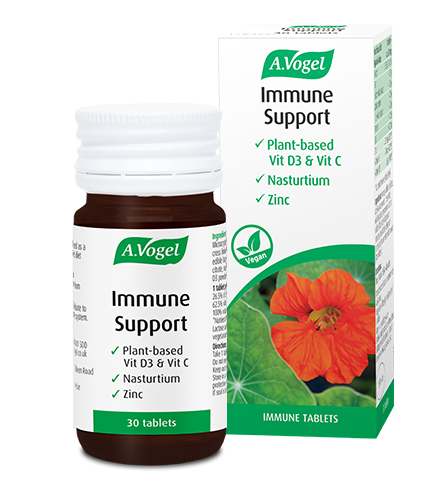Immune system diet tips
When it comes to supporting your immune system through diet, recently you might have been feeling some additional pressure to get things just right. But believe me when I say, no drastic steps are required! My top foody tips for supporting your immune system are as follows:
- Prioritise fruit and veg
- Choose a Mediterranean-style diet
- Up fermented foods
These steps, required to help support your immune system to the max, aren't too different to the dietary tips we've routinely recommended in the past. However, with the help of this blog, please let me help jog your memory and go into these themes in a little more detail so that you're full equipped and ready to ensure some of these good habits haven't slipped.
1. Prioritise fruit and veg
This isn't ground-breaking, and certainly is not any new advice. So, luckily, this tip isn't in any way unrealistic, as most of us are already well aware that fruit and vegetables are good for us and we should probably be trying to eat more.
However, in light of some new and current research, I'd just like to confirm why we go on about fruit and vegetables time and time again, and why they really should be a key part of our everyday diet.
It's thought that the unique combination of vitamins, and minerals, (including beta-carotene, vitamin C and zinc, to name a few), plus antioxidants and other biologically active, plant-based chemicals, are what make fruit and vegetables so helpfully healthy!
This means we'd really struggle to get quite the same combination anywhere else (as provided to you by nature). Also, these foods create a barrage of anti-inflammatory properties when we have them as part of our diet.
Of course, these are thought to have a number of advantages for our health, but new research has suggested that this is particularly helpful for supporting our immune cells and their all-important protective functions.
2. A Mediterranean-style diet is still top of the crop
A Mediterranean diet is inclusive of a good variety of fruit and vegetables, but there are also a few other features of this world-renowned dietary pattern that we should be willing to employ in order to support our immune system optimally.
Firstly, a focus on fats. See, fats are important, but we need to ensure that we are including the right types of fat in our diet and limiting the types which aren't so goof for us. This sounds technical, but actually by sticking to the right foods and cooking from fresh, it isn't so hard.
Whilst, if you're able to tolerate them ok, meat and dairy products are fine to include in moderation, the key is opting for good quality variations. For example:
- Grass fed or organic
- Limiting any extra processed varieties, for example, bacon, sausages etc.
- Not relying so much on meat products at every meal.
Fish and vegetable alternatives should ideally become more habitual for us. By working more fish and vegetable dishes into our diet, we can easily help to create a more favourable balance of good quality fats such as your omega 3, found in fish, nuts and good quality meat, omega-9, found in olives and olive oil, versus saturated fats and trans fats, which are found more readily in excess in meat and processed food products.
Then round off your meals with a good helping of fibre-rich wholegrains, plus limit your sugar, caffeine and alcohol intake (again, no extreme measures, so including a little of these alongside good, wholesome food is fine!) and you'll be well on your way to having the healthiest immune-boosting diet regime going2 – without really having to 'diet'!
3. Looking for an extra boost - opt for fermented veg
If you're wondering if there are any specific foods that you could add to your diet to help support your immune system that little bit further, then fermented foods could just be the one for you.
In a recent, large scale study investigating the effects of a whole number of different dietary food and drink items, fermented foods, but specifically fermented vegetables, were the stand out option for having a significantly positive influence on immune functions.
This means adding more foods like sauerkraut, kimchi and pickles to your diet which, in turn, help support your gut health with all their probiotic-goodness, could prove really useful for providing some extra immune-boosting support.
My Self-Care Tip: Immune-boosting vegetables
Here is my self care tip explaining why including more fermented vegetables in your diet can help to support your immune system:
It's a blood sugar thing
One other way in which bettering your diet can help to support underlying immune functions, is by positively influencing your blood sugar levels.
Unfortunately, in this day and age with convenience foods (and drinks) being so readily available, plus with the combination of other less favourable lifestyle habits such as eating for a larger proportion of the day, sleeping poorly and moving less becoming the norm for many, the effects on our blood sugar levels haven't exactly been very promising.
Then, poor blood sugar regulation is the driving factor for more general, systemic inflammation and disease, but actually, when it comes down to immune outcomes specifically, the results may not be what we want to hear.
Unfortunately, higher resting blood sugar levels create an environment that isn't so favourable for our all-important immune cells but instead, is more favourable for unwanted bacteria or viruses to thrive in – the very ones that can make us quite sick at the hand of cold and flu infection, for example.
This, in turn, can risk creating a double whammy, meaning those people who are in a pre-diabetic state may be more likely to fall ill in the first place, but may also have a harder time recovering if they were to become unwell.
Watching your weight is key too
As well as employing some of the dietary tips as mentioned above, supporting a healthy body weight can be one of the of most effective strategies for improving your blood sugar regulation and, in turn, supporting your immune health.
Worryingly, some recent research has suggested that higher BMIs, for example, those with a Body Mass Index of over 30, are more at risk of more serious outcomes, when it comes to falling ill by the viruses which can give rise to typical cold and flu-type symtpoms.
Interesting, vitamin D status also seems to correlate directly with body weight. That is, as your body weight and adipose tissue percentage creeps up, the less likely you are to have favourable vitamin D levels.6 We know just how important vitamin D is for supporting healthy immune responses, so this is definitely a nutrient we don't want to risk scrimping on.
However, luckily, as well as putting sensible lifestyle measures in place (getting outside for even just a short spell of exercise, is one), taking a daily vitamin D containing supplement such as A.Vogel Immune Support, can also help to minimise this effect.
A.Vogel Immune Support Tablets with Vitamin D, Vitamin C and Zinc, 30 tablets
£13.99 (30 tablets) In Stock Get it tomorrow, 5th July.
References:
- https://academic.oup.com/ajcn/article/108/1/136/5042153
- https://www.ingentaconnect.com/content/ben/emiddt/2014/00000014/00000004/art00003
- https://www.medrxiv.org/content/10.1101/2020.07.06.20147025v1
- https://pubmed.ncbi.nlm.nih.gov/22701840/
- https://eje.bioscientifica.com/view/journals/eje/aop/eje-20-0541/eje-20-0541.xml
- https://pubmed.ncbi.nlm.nih.gov/28392936/






 Looking to support your immune system? Well, look no further!
Looking to support your immune system? Well, look no further!


